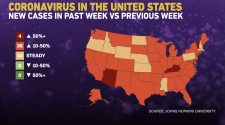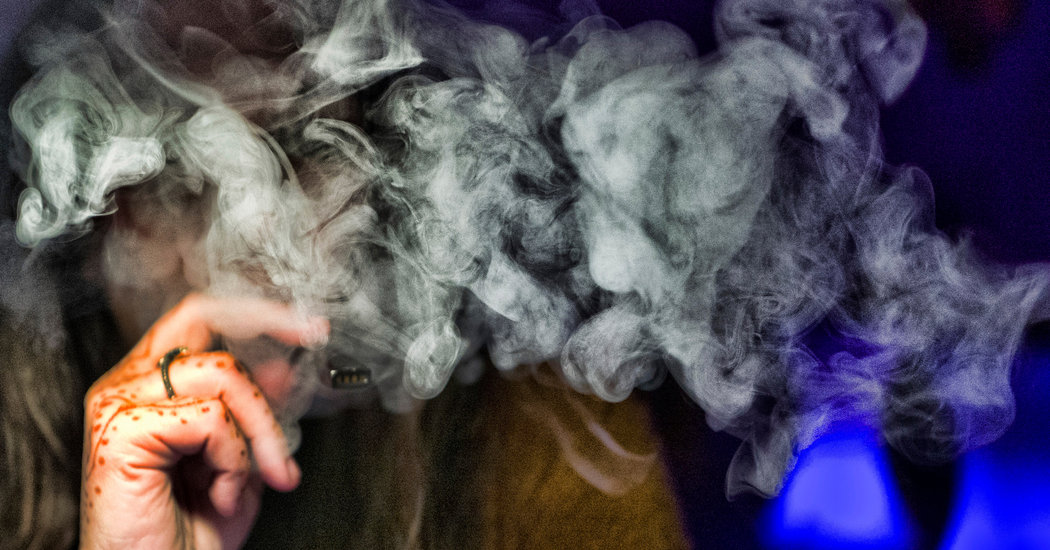Hundreds of people across the country have been sickened by a severe lung illness linked to vaping, and a handful have died, according to public health officials. Many were otherwise healthy young people, in their teens or early 20s. Investigators from numerous states are working with the federal Centers for Disease Control and Prevention and the Food and Drug Administration in an urgent effort to figure out why.
Here’s what we know so far.
Who is at risk?
Anyone who uses e-cigarettes or other vaping devices, whether to consume nicotine or substances extracted from marijuana or hemp, may be at risk because investigators have not determined whether a specific device or type of vaping liquid is responsible.
The Food and Drug Administration is warning that there appears to be a particular danger for people who vape THC, the psychoactive chemical in marijuana. The F.D.A. said a significant subset of samples of vaping fluid used by sick patients included THC and also contained a chemical called vitamin E acetate.
The F.D.A. issued this statement: “Because consumers cannot be sure whether any THC vaping products may contain vitamin E acetate, consumers are urged to avoid buying vaping products on the street, and to refrain from using THC oil or modifying/adding any substances to products purchased in stores.”
But some of the patients who have fallen severely ill said they did not vape THC. In 53 cases of the illness in Illinois and Wisconsin, 17 percent of the patients said they had vaped only nicotine products, according to an article published on Friday in The New England Journal of Medicine.
The researchers who wrote the journal article cautioned, “e-cigarette aerosol is not harmless; it can expose users to substances known to have adverse health effects, including ultrafine particles, heavy metals, volatile organic compounds and other harmful ingredients.”
The health effects of some of those chemicals are not fully understood, the researchers wrote, even though the products are already on the market.
What are the symptoms?
The early symptoms include fatigue, nausea, vomiting, coughing and fever, escalating to shortness of breath, which can become so extreme it can prompt an emergency room visit or require hospitalization.
Some patients have needed supplementary oxygen, including a ventilator in as many as a third of cases analyzed in The New England Journal of Medicine.
On lung scans, the illness looks like a bacterial or viral pneumonia that has attacked the lungs, but no infection has been found in testing.
What’s the best way to prevent the illness?
Health officials say that the riskiest behavior is using vaping products bought on the street instead of from a retailer, or those that have been tampered with or mixed.
Mitch Zeller, director for the Center for Tobacco Products at the F.D.A., said, “If you’re thinking of purchasing one of these products off the street, out of the back of a car, out of a trunk, in an alley, or if you’re going to then go home and make modifications to the product yourself using something that you purchased from some third party or got from a friend, think twice.”
The C.D.C. and some state health officials have recommended that people give up vaping of any type until the cause of the lung damage is determined.
E-cigarettes and other vaping devices were developed to help cigarette smokers quit their dangerous habit by providing a way to satisfy their nicotine addiction without inhaling the toxins the come from burning tobacco. But many medical experts now think even smokers should think twice about turning to e-cigarettes — and anyone who does not smoke should not vape.
“Adult smokers who are attempting to quit should consult with their health care provider and use proven treatments,” the authors of the analysis in The New England Journal of Medicine wrote.
They added, “Irrespective of these findings, e-cigarettes should never be used by youths, young adults, pregnant women and adults who do not currently use tobacco products.”
What should I do if I think I have the lung illness?
The C.D.C. says: “If you are concerned about your health or the health of a loved one who is using an e-cigarette product, contact your health care provider, or your local poison control center at 1-800-222-1222.”
Anyone who has shortness of breath that lasts more than a few hours or becomes severe should seek medical attention quickly. It is a warning that should not be ignored, doctors say.
Why do health investigators think this is linked to vaping?
Health investigators believe the illnesses are linked to vaping for several key reasons: The patients have vaped nicotine or marijuana extracts, or both, and do not have an infection or other condition that would explain the lung disease. Patients are now characterized as having the illness only if they have reported vaping within 90 days. In many of the reported cases, the patients had vaped much more recently.
E-cigarettes have been around for years. Why is this happening now?
There are several theories. One is that some dangerous chemical or combination of chemicals has been introduced into the pipeline of vaping products. Public health officials believe that when people vape this noxious cocktail, it sets off a dangerous, even lethal, reaction inside the lungs. These officials have said repeatedly that they do not yet know which substance or device may be causing this reaction, and that is the subject of their urgent investigation.
A second theory is that this syndrome is not, in fact, entirely new and that some people had gotten sick previously, but that the condition had not been recognized and identified as being linked to vaping. As vaping has grown in popularity — both with nicotine and marijuana — more cases may be showing up.
For the time being, though, public health officials seem to believe that the first theory is more likely and they are hunting for a substance, substances or process that might explain the surge in illnesses.
















